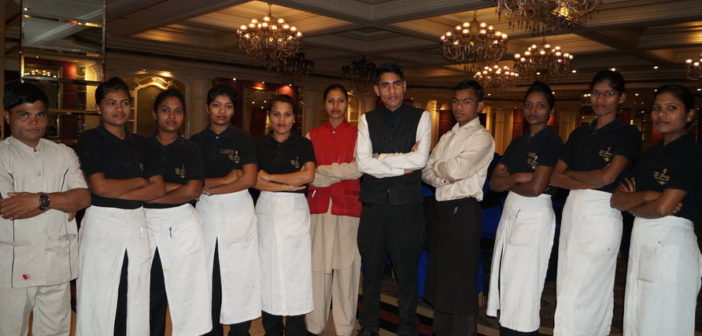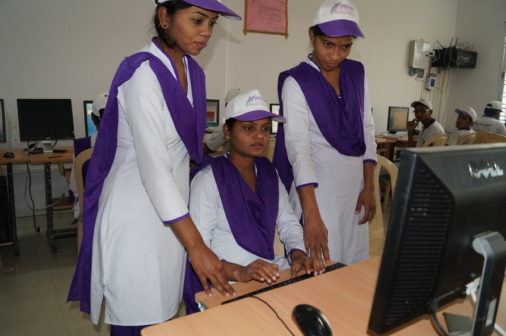Successful implementation of Rural Livelihood Mission calls for seamless coordination between people and processes across projects. We connected with R Vimala, IAS, CEO, Maharashtra State Rural Livelihood Mission (MSRLM) to learn about how various initiatives in skill development and employment, particularly for women are being carried out by MSRLM. Read on to know more about the challenges, solutions and advice for women to become responsible for her own growth and the role played by families in ensuring the success of women.
Maharashtra State Rural Livelihood Mission, also known as Umed is dedicated towards creating a positive and empowering environment for underprivileged and vulnerable people in rural Maharashtra. The Livelihood Mission works through the creation of self-help groups for empowering women, making reliable and self-sustaining. For this purpose, first, we have to develop their capacity and take up community building and institutional building. This is one of the ways to ensure growth and progress in various districts.
All our efforts are directed at building inclusive, democratic and self-managed community institutions by giving access to entitlements and financial services. Thus, over the years we’ve created several sustainable models of livelihoods, leading to a life of prosperity, dignity and security.
 We adopt the social inclusion concept. Normally, in a village people are all scattered. Though they may have a Gram Sabha, there’s no concept of uniting together or doing a project together. First step is to create communities by creating self-help groups of women. They have regular meetings and they are introduced to the concept of savings. We need to inculcate this methodically! For example, as a practice they’ve been following for ages, when they need money, they go to a moneylender and they remain in the constant state of debt. We ensure that they come out the moneylender system so that they are able to take the debt from this group itself. We are supported by several organizations such as Afam, CSE Center, Swaminathan Foundation, World Bank in generating sustainable models of agriculture, scaling up and capacity building. This also includes support in organic farming, organic manure, simple methods for pest control.
We adopt the social inclusion concept. Normally, in a village people are all scattered. Though they may have a Gram Sabha, there’s no concept of uniting together or doing a project together. First step is to create communities by creating self-help groups of women. They have regular meetings and they are introduced to the concept of savings. We need to inculcate this methodically! For example, as a practice they’ve been following for ages, when they need money, they go to a moneylender and they remain in the constant state of debt. We ensure that they come out the moneylender system so that they are able to take the debt from this group itself. We are supported by several organizations such as Afam, CSE Center, Swaminathan Foundation, World Bank in generating sustainable models of agriculture, scaling up and capacity building. This also includes support in organic farming, organic manure, simple methods for pest control.
Since people depend mostly on Agriculture as a means of sustenance, they carry out farming activities on their own land in their villages. But, farming yields are seasonal and they are prone to natural calamities like droughts, floods etc. So, we encourage them to learn other parallel vocations that could be allied to farming, like poultry, dairy, fisheries, food processing and so on. We take several measures to help them avoid migration to cities by trying to create sustainable livelihoods in their own villages. However, the youth are more interested in exploring jobs in the cities. This is where skill development and vocational training initiatives are being implemented through various schemes partnering with Project Implementation Agencies (PIAs) or training partners.
How migration cannot be avoided and how the youth are mentored for migration
However, we cannot provide skilled jobs in their own village; in such a case, one person from the family may probably get migrated.There is a high possibility that they will not find a suitable job in their village. Let’s assume, he person gets trained in Hospitality Industry and has to work in Café Coffee Day, or in a mall, or an industry that is not necessarily located in the village, then, preparing them for migration becomes part of skill based training. For that we have Migration Support Centers, when they go out of the village, they need support and mentoring.
In three months, the candidates get complete training – they are provided boarding and lodging, they are trained in various skills, including personality development, they get familiar with urban set up, and they start staying away from their families. The stay is facilitated by the PIA and the orientation happens in a systematic manner. So, they get mentored and this helps them in taking up the job in the city. We help them in slowly getting accustomed it the new environment. They are able to send the money home to their parents which is perhaps the biggest joy. The parents also understand why their children had to migrate.
Currently, we are training people in 18 industry sectors, that includes Hospitality, Retail, Tourism, Automotive, Manufacturing and so on. Some of our skilling partners like Inductus, Dhatri Foundation etc find out what the industry needs and then they provide skill based training, then they help us channelize the rural youth in that direction. Let’s look at some of the details about training and placement from the DDU-GKY scheme.
The Job Placement and Skills Development vertical – A Snapshot from DDU-GKY Projects
 The “Deen Dayal Upadhyaya Grameen Kaushalya Yojana” (DDU-GKY) was launched under DAY-NRLM on 3rd December 2015 in Maharashtra. It seeks to “Transform rural poor youth into an economically independent and globally relevant workforce”. Under DDU-GKY, the focus is on retention and career progression.
The “Deen Dayal Upadhyaya Grameen Kaushalya Yojana” (DDU-GKY) was launched under DAY-NRLM on 3rd December 2015 in Maharashtra. It seeks to “Transform rural poor youth into an economically independent and globally relevant workforce”. Under DDU-GKY, the focus is on retention and career progression.
At the EC meeting held on 8th January 2015, 30 proposals were approved. Maharashtra was approved as an Action State Plan (ASP) by the Empowered Committee of the Ministry on 22-7-2015. At present, there are 26 PIAs and 28 training centres under DDU-GKY in Maharashtra.
These PIAs are working in 10 different sectors on 41 trades. Target for FY 2016-17 is 5284 of which total achievement is 4563. Under RSETI Target for FY 2016-17 is 24880 so far 22684 candidates with settlement ration of 58% and credit linkage is 32%. Those who seek skilling for wage employment have to be converged with DDU-GKY.
Those seeking self-employment with RSETI are provided post training follow-up for settlement in self-employment and entrepreneurship while those who seek livelihood upgradation are converged with NRLM livelihood activities.
Women’s challenges
Women need to do the tough balancing act between home and work. Hence sensitivity of family is very important to get started, however it’s not necessary that they supports them all the time. So, the family and society has to become more sensitive, only then the women can become more enterprising.
Of course, women have become more confident because of community support, they have to learn newer methods, new technologies in respective professions, so they have to continuously keep themselves updated to become better. In rural areas, many of the women don’t know how to read and write , so basic literacy efforts are needed, reading and writing skills, understanding the business if they need to start off as entrepreneurs.
The mindset has to change, attitude towards women and how she should be supported by the family matters a lot. On an average, we still don’t find this support. They don’t have equal status. Even though women have progressed, it is not as though crime against women has stopped, and they are not looked up as equal. Many places this is not the case. Even though government makes all possible efforts, ultimately it is the people who have to change. And there could be many ways to ensure that right people get benefited from government schemes.
Gender bias comes up in many cases. For a women to be an entrepreneur or an employee and manage her own family life could be difficult at times. And it’s not about a man or a woman, it’s the concept of a family. For a vehicle to run smoothly, all the parts have to work together only then you can maintain proper momentum. Our country can develop much faster if we can build communities and achieve common goals.













मला ddujky chi सुरवात करायची आहे